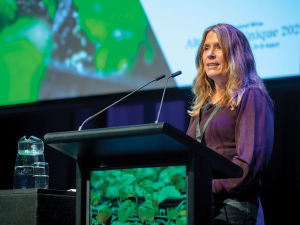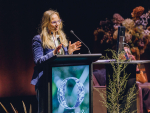The inaugural Research & Innovation Forum was a stimulating glimpse at the research, innovation and technology helping shape the future of New Zealand wine.
Held as part of New Zealand Winegrowers’ two-day Altogether Unique 2024, the innovation forum was introduced by Bragato Research Institute (BRI) Chief Executive Dr Juliet Ansell, who shared an ethos of “thinking big, starting small”. Juliet acknowledged the reality of not being able to do everything, and discussed an ideal research focus of 70% core, 20% tangential and 10% radical projects, with the latter two to drive innovation.
The forum was organised into five sessions, kickstarted by Hans Loder, Vineyard Manager and Viticultural Consultant to Coonawarra’s Penley Estate, on ‘The Future of Smart Management’, with an insightful look at data capture, management and use. Data is generated and often haphazardly captured by individuals, businesses and industries, but the questions of what we do with it, who owns it, and whether it is used in a strategic manner are often left to chance or simply ignored. Hans outlined how and where to start, delving into data reusability and how mapping what you already have can show what the next steps might be. He touched on current and next generation technology, such as 3D wearable tech used to ‘look’ around a vineyard, and how capturing data in real time can aid in more efficient practices, as he experienced when managing a Coonawarra vineyard frost event while having lunch in Vancouver.
That was an excellent scene-setter for Jason Cook, Indevin Group Winemaker, who explained the digital-driven productivity improvements at the company’s Fifteen Valleys winery, which is Marlborough’s largest facility. Using the Six Sigma DMAIC model (Define, Measure, Analyse, Improve and Control) they built four virtual wineries with paper highways to examine all aspects of winery processes. Subsequent real time tracking via sensors in receival bins, presses, pumps, flow metres and tanks allowed them to pinpoint and eliminate areas of inefficiency. This may seem beyond the scope of what most New Zealand wineries experience, but it was a fascinating look at how a winery that grew from 4,000 to 50,000 tonnes in 20 years was able to undergo a digital transformation. They completely streamlined their systems and illuminated how seemingly minor issues, such as varying press cycle timings, can create significant bottlenecks.
‘Looking Micro to Make Big Changes’ was a gearshift to biochemistry. Professor Wayne Patrick from Victoria University outlined the current enzyme toolbox, with products mostly based upon carbohydrateactive hydrolases. His enzyme ‘tree of life’ slide illustrated the sheer potential of what else is out there – a vast bacterial and fungal resource for potentially different actions. With GMO regulations currently being revisited, this is an area of real potential. Next up was Plant & Food Research Science Group Leader and Grapevine Trunk Disease specialist Dr Hayley Ridgway, who explored the microbiome potential for vine health.
The two speakers in the Viticulture Innovations session, Mark Piper, Chief Executive of Plant & Food Research, and Dr Alistair Scarfe, co-founder and Chief Engineer of Robotics Plus, brought extensive experience in the agriculture and horticulture sectors, offering insight for viticultural needs. Mark explained how Plant & Food is building a digital twin platform that can create environmental, plant (tree/fruit), understory, soil, and biodiversity models that process data inputs from physical orchards and vineyards. Then Alistair gave a glimpse of the fast-moving world of autonomous vehicle multi-use platforms for spraying, mowing, trimming and increasingly, data scanning, which he says will see an increasing degree of specificity and targeted deployment.
Session four was ‘Innovations in Genetics’, with Dr Darrell Lizamore and Dr Ellie Bradley of BRI respectively covering genetic technologies for grapevine improvement and how RNA technology can complement sustainable viticulture. Darrell’s talk focused on the various gene editing techniques such as CRISPR to adapt vines for the likes of drought and disease resistance, and the pros and cons of the methods in terms of selectivity and GMO acceptability. Ellie (see August/September 2024 Winegrower Magazine) discussed the nascent RNA tech solutions for disease, chemical/spray residues, biosecurity concerns, early season frosts and water restrictions. For example, an RNA spray could help temporarily retard bud formation when frost is imminent. It was great to see the two technologies explained so clearly side by side, with one – gene editing – offering permanent vine solutions, and the other – RNA tech – a short-term toolbox.
The final speakers covered the New Zealand Wine Roadmap to Net Zero 2050, the success of which will be reliant on much of the research, innovation and technologies covered in the forum.
For more on the Research & Innovation Forum go to nzwine.com/en/ initiativesevents/altogetherunique












